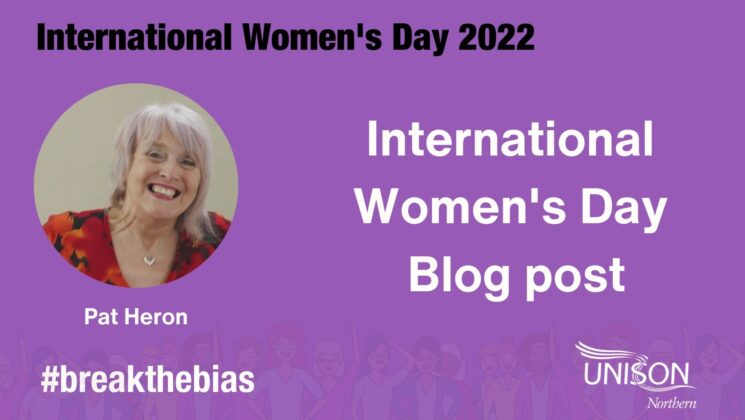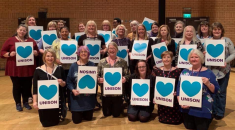For this blog Ronagh Craddock, regional organiser and staff lead for our regional women’s network sat down with Pat Heron, NEC health delegate, chair of the regional women’s network, and leader in NCNTW branch for a discussion in recognition of international women’s day 2022.
RC: Hi Pat, thanks for agreeing to speak with me today. I’m looking forward to hearing your thoughts on all things UNISON and women. To start off, can you tell me a bit about how you got involved in the women’s network?
PH: I had been a member of UNISON for a number of years and even though I was active at the time, I wasn’t aware of the network. It was actually Kenny Bell, an activist in Newcastle City branch, who reached out to me and told me about the network and encouraged me to get involved.
RC: What would you say is the main purpose of the women’s self-organised group and how does it benefit members?
PH: Women still have a lot to fight for. The network is a place for women to come together and share their experiences at work and in the community, and to organise, educate and support each other to address issues affecting women through UNISON structures and branches.
The support women in the network give each other is phenomenal. For example when I got involved, Margaret Beck, a UNISON activist, provided me with huge amounts of support and encouragement, including putting me forward as a delegate to national women’s standing orders committee. Without women like Margaret Beck I would not be where I am today.
RC: What is an example of something the network is working on at the moment?
PH: Recently we have done a lot of work to transform the way health and safety within the workplace is seen. Covid-19 highlighted the crucial role that UNISON health & safety reps play to keep staff safe at work, but for a long time the majority of health & safety reps have been men. We ran a regional campaign to encourage UNISON women to come forward and be trained as health & safety reps. The campaign was very successful, resulting in the majority of health & safety reps regionally now being women. This means issues like menopause, sexual harassment, and flexible working, are increasingly picked up and perceived under the health and safety remit.
Other key priorities are providing workplace support to those experiencing domestic abuse, our campaign for the Convention on the Elimination of all forms of Discrimination Against Women (CEDAW) to be implemented into domestic law, and tackling the increasing levels of in-work poverty. Sadly we are seeing more of this due to the cost of living rises.
RC: Thanks Pat. Can you tell me a bit about how can women get involved in UNISON?
PH: Our self-organised groups (SOGs) are the foundation of UNISON and they will give you support to navigate through the wider union so I would always recommend members to get involved with one of our SOGs where appropriate. Part of the work of SOGs is understanding the barriers facing members who want to become active, and providing support to overcome those barriers. They can also help a lot with improving confidence for people’s roles in UNISON but also in their wider life.
RC: Just a reminder of our four UNISON self-organised groups for black members, disabled members, LGBT+ members, and women members. We also have equality groups for young members and retired members. Anyone interested should contact n.region@unison.co.uk to be added on to any of our regional SOG mailing lists.
RC: What about in UNISON branches? What would you say to anyone who would like to become active in their branch and is passionate about issues affecting women.
PH: Branches all have a responsibility to bring more women through and support women into leadership positions. Proportionality is really important in UNISON. It means making sure that people in leadership roles in UNISON are representative of the makeup of our membership. In UNISON over 75% of our membership are women.
We have the role of women’s officer in branches but it’s not only women’s officers who should be raising issues that affect women, that is everyone’s job. It’s also everyone’s job to encourage women to join and get active in UNISON.
RC: Today is International Women’s day, can you tell us why this day is important and how the network will be celebrating?
PH: International Women’s Day is a global event. It is important to have these highlighted days when everyone can celebrate what is going well and also plan for what more needs to be done.
We are actually going to a comedy event in person rather than meeting virtually, which I’m really looking forward to. The network has funded a number of tickets for a comedy gala on International Women’s Day which is a line-up of women stand ups in the region. It has been a really difficult two years for everyone, particularly key workers who have been delivering crucial services throughout the pandemic. We want to take a moment to pause, plus all of the funds go to Rape Crisis Tyneside and Northumberland which is an organisation that we are proud to support.
Regionally we will also be profiling the brilliant women leaders in branches across the Northern Region and celebrating the work they do. I am also doing a twitter takeover of our regional UNISON twitter account which I’m looking forward to!
RC: Final question – Who has inspired you?
PH: Margaret Beck, who very sadly passed away after contracting covid in March 2020.
RC: Can you tell me why she inspired you?
PH: She took the time to include and encourage people. It was all about doing what she could to make things better for other people, and to support other people. She taught me how you could have influence as a woman in UNISON to make things better for people, and watching her journey was very inspiring.
RC: Thanks Pat that’s brilliant. Thanks for your time.
PH: Thanks Ronagh.


